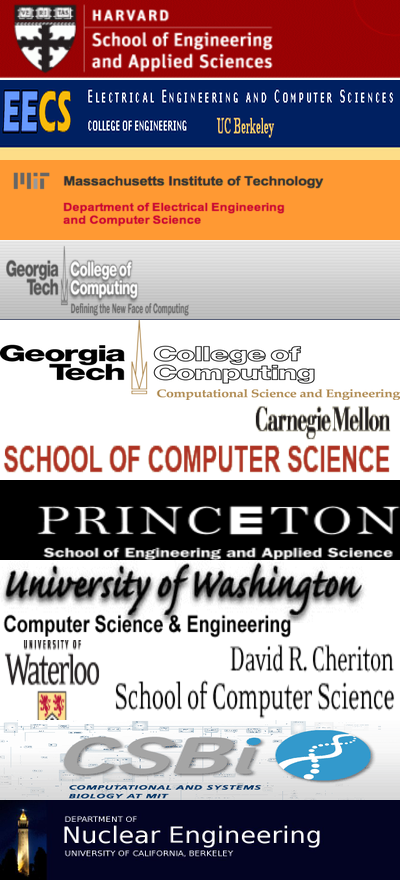Check out my first novel, midnight's simulacra!
Grad school: Difference between revisions
Jump to navigation
Jump to search
| Line 19: | Line 19: | ||
Upon entering MSCS in Fall 2008, I'd have said intrusion detection first, programming language design second, and esoteric automata theories third. Indeed, many things do come to pass. | Upon entering MSCS in Fall 2008, I'd have said intrusion detection first, programming language design second, and esoteric automata theories third. Indeed, many things do come to pass. | ||
I've prepared some [http://dank.qemfd.net/tabpower/msadvice.pdf Disarmingly Forthright Advice for CSMS Students] at this (as of 2009) [http://grad-schools.usnews.rankingsandreviews.com/best-graduate-schools/top-computer-science-schools/rankings 9th-ranked | I've prepared some [http://dank.qemfd.net/tabpower/msadvice.pdf Disarmingly Forthright Advice for CSMS Students] at this (as of 2009) [http://grad-schools.usnews.rankingsandreviews.com/best-graduate-schools/top-computer-science-schools/rankings 9th-ranked graduate computer science program] of ours, and also some preparation materials for the [[CS GRE|CS Subject Exam GRE]]. Take these animadversions for whatever they're worth. | ||
===Fall 2008=== | ===Fall 2008=== | ||
Revision as of 09:31, 13 October 2009

PhD Applications
- CS GRE Subject Test: 2009-10-10 at GSU
- Scores going to: GT, MIT, Harvard, UWaterloo, UWashington
MSCS at the Georgia Institute of Technology
I am currently a Masters student at Georgia Tech's College of Computing, following the MS-Computer Science (Thesis Option) track. I specialize in:
- high-performance computing
- algorithms, programming methodologies, languages and compilers for multicore/manycore
- cache-, cpu-, and topology-adaptive programming methodologies, compilers and libraries
- ...and thus, perhaps, computational solutions to Big Problems. Cancer sucks. Fusion's hard.
- Let's give the scientists some bigger boxing gloves.
- algorithms and implementation of high-performance pattern matching
- for network security (wire-speed, low-latency, rich operators)
- and bioinformatics (high-volume, gappy/fuzzy, multidimensional)
- especially using architecture-aware automata theory (Memory-tuned, SIMD-based Glushkov, Thompson, XFA, etc...)
- intrusion detection and prevention (theory and implementation)
Upon entering MSCS in Fall 2008, I'd have said intrusion detection first, programming language design second, and esoteric automata theories third. Indeed, many things do come to pass.
I've prepared some Disarmingly Forthright Advice for CSMS Students at this (as of 2009) 9th-ranked graduate computer science program of ours, and also some preparation materials for the CS Subject Exam GRE. Take these animadversions for whatever they're worth.
Fall 2008
- CS6262 - Network Security with Professor Wenke Lee (3 hours)
- CS6290 - High Performance Computer Architecture with Professor Hyesoon Kim (3 hours)
- CS6260 - Applied Cryptography with Professor Sasha Boldyreva (3 hours)
Spring 2009
- CS8803MCA - Multicore and Manycore Architecture with Professor Tom Conte (3 hours)
- CS7530 - Randomized Algorithms with Professor Richard Lipton (3 hours)
- CS6238 - Secure Systems with Professor Mustaq Ahamed (3 hours)
- CS6241 - Compiler Design with Professor Santosh Pande (3 hours)
Fall 2009
- CS6390 - Programming Language Design with Professor Spencer Rugaber (3 hours)
- CSE6230 - High Performance Parallel Computing with Professor Rich Vuduc (3 hours)
- CSE6140 - Scientific Computing Algorithms with Professor David Bader (3 hours)
- CS8001CAS - Computer Architecture Seminar with Professor Nate Clark (1 hour)
- Teaching Assistant: CS6290 - High Performance Computer Architecture for Professor Milos Prvulovic
Spring 2010
- CS7000 - Masters Thesis (9 hours)
- with whom?? professors: your name could be here!
GT College of Computing Notes
- OIT Pharos is now used for printing.
- The Library has a Computer Science Research page
- TSO's page on the Hogwarts Cluster